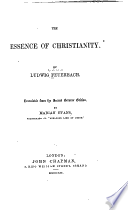Introduction, Z. Hanfi, trans., in The Fiery Brook (1972), pp. 101-102
The Essence of Christianity (1841)
Works

The Essence of Christianity
Ludwig FeuerbachFamous Ludwig Feuerbach Quotes
“I would rather be a devil in alliance with truth, than an angel in alliance with falsehood.”
Source: The Essence of Christianity (1841)
Aber freilich für diese Zeit, welche das Bild der Sache, die Kopie dem Original, die Vorstellung der Wirklichkeit, den Schein dem Wesen vorzieht … denn heilig ist ihr nur die Illusion, profan aber die Wahrheit.
Preface to Second Edition (1843)
The Essence of Christianity (1841)
Introduction, Z. Hanfi, trans., in The Fiery Brook (1972), p. 99
The Essence of Christianity (1841)
Preface to Second Edition (1843)
The Essence of Christianity (1841)
Ludwig Feuerbach Quotes about God
Lecture XXX, Atheism alone a Positive View
Lectures on the Essence of Religion http://www.marxists.org/reference/archive/feuerbach/works/lectures/index.htm (1851)
Introduction, Z. Hanfi, trans., in The Fiery Brook (1972), p. 102
The Essence of Christianity (1841)
Part I, Section 16
Principles of Philosophy of the Future http://www.marxists.org/reference/archive/feuerbach/works/future/index.htm (1843)
Lecture XXX, Atheism alone a Positive View
Lectures on the Essence of Religion http://www.marxists.org/reference/archive/feuerbach/works/lectures/index.htm (1851)
Lecture XX, see [Lectures on the Essence of Religion, Harper & Row, New York, 1967, 187, Transl. Ralph Manheim] German: [Vorlesungen über das Wesen der Religion, Wigand, Leipzig, 1851, 241]
Lectures on the Essence of Religion http://www.marxists.org/reference/archive/feuerbach/works/lectures/index.htm (1851)
Part I, Section 14
Principles of Philosophy of the Future http://www.marxists.org/reference/archive/feuerbach/works/future/index.htm (1843)
Ludwig Feuerbach Quotes
“I distinguish religion from theism,”
Lecture V, R. Manheim, trans. (1967), pp. 34-35
Lectures on the Essence of Religion http://www.marxists.org/reference/archive/feuerbach/works/lectures/index.htm (1851)
Context: Religion is indeed essential to or innate in man, but … this is not the religion of theology or theism, not an actual belief in God, but solely the religion that expresses nothing other than man’s feeling of finiteness and dependency on nature. … I distinguish religion from theism, the belief in a being distinct from nature and man. … Today theism, theology, the belief in God have become so identified with religion that to have no God, to theological being, is considered synonymous with having no religion. But here we deal with the original elements of religion. It is theism, theology, that has wrenched man out of his relationship with the world, isolated him, made him into an arrogant self-centered being who exalts himself above nature. And it is only on this level that religion becomes identified with theology, with the belief in a being outside and above nature as the true God. Originally religion expressed nothing other than man’s feeling that he is an inseparable part of nature or the world.
Z. Hanfi, trans., in The Fiery Brook (1972), p. 68
Towards a Critique of Hegel’s Philosophy (1839)
Introduction, Z. Hanfi, trans., in The Fiery Brook (1972), pp. 103-104
The Essence of Christianity (1841)
Preface to Second Edition (1843)
The Essence of Christianity (1841)
“The history of philosophical system is the picture gallery of reason.”
Z. Hanfi, trans., in The Fiery Brook (1972), p. 68
Towards a Critique of Hegel’s Philosophy (1839)
Lecture I, , R. Manheim, trans. (1967), p. 2
Lectures on the Essence of Religion http://www.marxists.org/reference/archive/feuerbach/works/lectures/index.htm (1851)
Z. Hanfi, trans., in The Fiery Brook (1972), p. 75
Towards a Critique of Hegel’s Philosophy (1839)
Lecture V, R. Manheim, trans. (1967), pp. 35-36
Lectures on the Essence of Religion http://www.marxists.org/reference/archive/feuerbach/works/lectures/index.htm (1851)
Lecture II, R. Manheim, trans. (1967), p. 11
Lectures on the Essence of Religion http://www.marxists.org/reference/archive/feuerbach/works/lectures/index.htm (1851)
As quoted in "Voices of the New Time" as translated by C. C. Shackford in The Radical Vol. 7 (1870), p. 329
Lecture XXX, Atheism alone a Positive View
Lectures on the Essence of Religion http://www.marxists.org/reference/archive/feuerbach/works/lectures/index.htm (1851)
Lecture XXX, Atheism alone a Positive View
Lectures on the Essence of Religion http://www.marxists.org/reference/archive/feuerbach/works/lectures/index.htm (1851)
Z. Hanfi, trans., in The Fiery Brook (1972), p. 66
Towards a Critique of Hegel’s Philosophy (1839)
Part II, Section 21
Principles of Philosophy of the Future http://www.marxists.org/reference/archive/feuerbach/works/future/index.htm (1843)
Z. Hanfi, trans., in The Fiery Brook (1972), p. 67
Towards a Critique of Hegel’s Philosophy (1839)
Z. Hanfi, trans., in The Fiery Brook (1972), p. 67
Towards a Critique of Hegel’s Philosophy (1839)
Part III, Section 29
Principles of Philosophy of the Future http://www.marxists.org/reference/archive/feuerbach/works/future/index.htm (1843)
Preface
The Essence of Christianity (1841)
Lecture I, Occasion and Context
Lectures on the Essence of Religion http://www.marxists.org/reference/archive/feuerbach/works/lectures/index.htm (1851)
Z. Hanfi, trans., in The Fiery Brook (1972), p. 54
Towards a Critique of Hegel’s Philosophy (1839)
Part III, Section 31
Principles of Philosophy of the Future http://www.marxists.org/reference/archive/feuerbach/works/future/index.htm (1843)
Der Mensch ist, was er ißt.
Die Naturwissenschaft und die Revolution [Natural science and the revolution] (1850), repeated in Das Geheimnis des Opfers, ober der Mensch ist was er ißt http://books.google.com/books?id=QYINAAAAYAAJ&pg=PA1 [The Mystery of Sacrifice, or Man is What He Eats] (1862)
“To enrich God, man must become poor; that God may be all, man must be nothing.”
The Essence of Christianity (1841)
“Can any good come out of Nazareth?”
This is always the question of the wiseacres and the knowing ones. But the good, the new, comes from exactly that quarter whence it is not looked for, and is always something different from what is expected. Everything new is received with contempt, for it begins in obscurity. It becomes a power unobserved.
As quoted in "Voices of the New Time" as translated by C. C. Shackford in The Radical Vol. 7 (1870), p. 329
